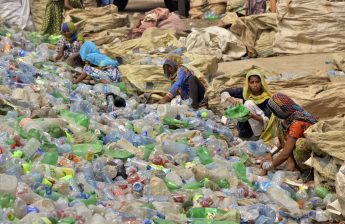A Report by Eunomia Consultants on the impact of the use of Oxo-biodegradable (OBP) plastic carrier bags on the environment has been published by the EU Commission.
Key findings of the report include:
“The debate around the biodegradability of OBP plastic is not finalised, but should move forward from the assertion that OBP plastics merely fragment, towards confirming whether the timeframes observed for total biodegradation are acceptable from an environmental point of view and whether this is likely to take place in natural environments.” We agree, and would expect to hear no more about “oxo-fragmentable” plastics.
The Oxo-biodegradable Plastics Association now looks forward to working with the Commission to answer these questions. They are not easy, but we are confident that we and our scientific consultants can satisfy the Commission on these points.
“Without exception, the scientific evidence suggests that the conditions present during the abiotic stage (which in most studies is simulated by some form of accelerated pre-treatment) of degradation will have a significant impact on the materials’ ability to subsequently biodegrade.”
“From the information studied, the authors of this Report can believe that it is possible for a OBP plastic to fully mineralise in an open environment, with the prodegradant additives encouraging this action, and thus the polymers and entrained substances can be assimilated into the natural environment.”
It is often claimed that biodegradable plastics are likely to encourage littering, but the Report says, “rather than speculation, objective behavioural research is required to move this topic forward in a constructive manner.” We agree. In our view, even if there were a label describing a product as oxo-biodegradable, the type of people who cause litter are not likely to look for the label before deciding to throw a plastic item out of a car window.
With regard to the marine environment, there is evidence – from Station d’essais de Vieillissement Naturel de Bandol on the coast of France that oxo-biodegradable plastic will degrade to low molecular-weight materials under natural conditions in water, and samples were then studied at Queen Mary University London.
The samples were proved to be biodegraded by bacteria commonly found in the oceans, and separate samples by bacteria commonly found on land. The degraded plastic was also proved to be non-toxic to those bacteria.
Commenting on these two pieces of work the Report notes that
“during pre-ageing under water, PAC plastic is much more susceptible to UV degradation than conventional plastic (as demonstrated by the large difference in molecular weight). The biodegradation tests also indicate that bacteria can feed off plastic measured with a higher molecular weight than the 5,000 limit often used to characterise this.”
We find it difficult to understand the trend towards replacing conventional oil-based plastics with plastics derived partly or fully from crops. Although the Report does not deal specifically with this issue we think it is important to understand it when considering the materials from which carrier bags and packaging could be made.
OBP and other oil-based plastics do not cause fossil resource-depletion. This is because they are made from ethylene – an inevitable by-product of oil which used to be wasted. The oil is extracted to make fuels and lubricants, and the same amount would be extracted even if oil-based plastics did not exist.
Therefore, until other fuels and lubricants are found for vehicles, ships, aircraft and factories, it makes sense to use this by-product instead of consuming large amounts of fossil fuel in the agricultural production, transport, and polymerisation of “crop-based” plastics.
The Report comments on recycling, but it misunderstands the role of stabilisers.
It is clear from the scientific reports that it is not necessary to add stabilisers unless the recyclate is being used to make long-life products, in which case the manufacturer would be adding stabilisers anyway. These stabilisers are in a quantity and with a chemistry which he would normally use, and no special arrangements are necessary for recyclate containing OBP.
The Report comments that there is no CEN standard for OBP, but this is because the technical committees of CEN are dominated by representatives of the crop-based plastics industry. If this obstruction could be overcome, the Oxo-biodegradable Plastics Association would draft a suitable European Standard and present it to CEN.
In the meantime the American, British French and Swedish standard test methods are suitable for providing the information which customers and governments need to know.The OPA will be making a detailed submission to the EU Commission on this report.
The report also deals with Composting, and Landfill, but as these are applications for which OBP is not intended, we will not deal with them here.
Pro-oxidant Additive Containing-:
www.biodeg.org
57-63 church road,london sw195sb
Tel:+44(0)8456769120
Registered in England no.8107377





